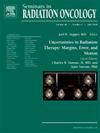hpv阳性口咽癌的降级管理:个性化方法改善结果
IF 3.2
3区 医学
Q3 ONCOLOGY
引用次数: 0
摘要
人乳头瘤病毒(HPV)阳性口咽癌(OPC)越来越普遍,与HPV阴性口咽癌和其他与吸烟和酒精相关的头颈部恶性肿瘤相比,其预后良好。降低hpv阳性OPC的最终治疗升级是一种有吸引力的策略,旨在保持肿瘤疗效,同时减少短期和长期毒性并改善生活质量。在这篇文章中,我们概述了降低辐射升级的方法,包括使用替代全身治疗、减少全身治疗剂量、减少辐射剂量和/或体积。我们还强调了降级研究的成功和警示结果,并倡导在hpv阳性OPC的未来降级试验中采用个性化的方法。本文章由计算机程序翻译,如有差异,请以英文原文为准。
De-escalated Management of HPV-positive Oropharyngeal Carcinoma: Improving Outcomes with Personalized Approaches
Human papilloma virus (HPV)-positive oropharyngeal cancer (OPC) is increasingly prevalent and has a favorable prognosis compared to HPV-negative OPC and other head and neck malignancies associated with smoking and alcohol. De-escalation of definitive therapy for HPV-positive OPC is an attractive strategy aiming to maintain oncologic efficacy while reducing short-term and long-term toxicities and improving quality of life. In this article, we outline approaches to de-escalation including use of alternative systemic therapies, reduction in dose of systemic therapy, and reductions in radiation dose and/or volume. We also highlight successes and cautionary outcomes from de-escalation studies and advocate for a personalized approach to future de-escalation trials in HPV-positive OPC.
求助全文
通过发布文献求助,成功后即可免费获取论文全文。
去求助
来源期刊
CiteScore
5.80
自引率
0.00%
发文量
48
审稿时长
>12 weeks
期刊介绍:
Each issue of Seminars in Radiation Oncology is compiled by a guest editor to address a specific topic in the specialty, presenting definitive information on areas of rapid change and development. A significant number of articles report new scientific information. Topics covered include tumor biology, diagnosis, medical and surgical management of the patient, and new technologies.

 求助内容:
求助内容: 应助结果提醒方式:
应助结果提醒方式:


